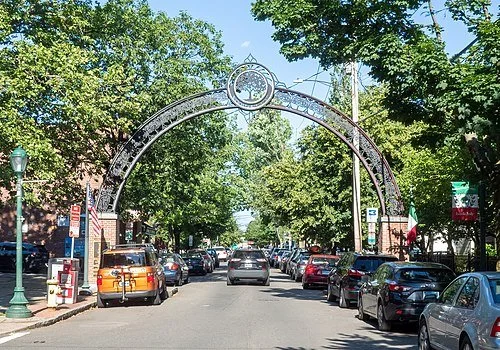Chris Powell: Amidst the failure to lift the poor, cities need gentrification
Approaching Wooster Square Park, in New Haven. The Wooster Street archway is decorated with a cherry blossom tree, a symbol of New Haven. It’s a reminder of the pleasure and advantages of city life, notes Chris Powell.
MANCHESTER, Conn.
Especially in Connecticut, elected officials claim credit for trying to solve the problems they themselves created. It happened again recently with legislation proposed in the General Assembly to require larger municipalities to create "fair rent" commissions with power to cancel or reduce residential rent increases.
Yes, along with housing prices generally, rents have been increasing dramatically since inflation exploded. By some calculations housing has never been more expensive relative to incomes. But the legislation effectively blamed landlords when the rent increases are largely the result of government's own policies.
Impairing the ability of landlords to make money would only discourage boosting the supply of rental housing.
Connecticut policy long has allowed municipal zoning regulations to stunt the housing supply. Like rent control, restrictive zoning subverts the market. If housing was easier to build, supply would grow and prices fall.
A recent state law aims to diminish the exclusivity of suburban zoning, but it is yet to have much effect even as it is prompting anger in some towns.
The housing shortage has bigger underlying problems.
First, people want to have children but don't want to ensure that housing is available nearby for their kids when they start out on their own. Of course, peace and quiet are great but many people want government to provide peace and quiet at the expense of people who don't yet have adequate housing -- to provide peace and quiet through restrictive zoning.
And second, people justifiably want good neighbors. Quite apart from racial and ethnic prejudices, which are fading, good neighbors means that people who will behave decently, pay more in taxes than they consume in government services, and not manifest the pathologies associated with the never-ending poverty and depravity of the cities.
Connecticut's zoning-reform legislation vindicates these concerns insofar as it calls itself "fair share" legislation, confirming that new residents are a burden. Once or twice even the mayors of Hartford and New Haven have been candid about wanting to disperse their poorest residents to the suburbs. Indeed, poverty is no virtue, for with the poor come crime, dependence, and neglected children who wreck schools.
Suburbs sneer at this while city mayors have to cope with it. If government's welfare, education and urban policies were not chronic failures, suburbs might be more welcoming to new residents and to the housing construction Connecticut needs so badly.
All state government has to do is stop manufacturing poverty.
But maybe with the housing legislation Connecticut has been putting too much focus on suburbs. Lately the glorious cherry blossoms in Wooster Square Park, in New Haven, have provided a spectacular reminder of the advantages and potential of city life.
After all, the main problem with cities today is not infrastructure as much as many of the people who live there. A city with "mixed-use development" has great virtues -- commerce, industry, hospitals and medical offices, various kinds of residences, markets, restaurants, churches, theaters, and parks, all within walking distance of each other, with shops and housing often in the same buildings. In such places it is possible not just to live without a car but to be glad to be free of its expense.
Thanks in large part to Yale University, downtown New Haven somewhat sustains this way of life. Downtown Hartford lost it 60 years ago with horribly misguided urban redevelopment. But under the same mayors who would like to export their poor, both cities are waking up, striving to increase middle-class housing downtown or nearby.
Sometimes this effort is scorned as "gentrification," but gentrification is exactly what the cities need. Why is Stamford booming while Bridgeport -- only 23 miles east on the same railroad, highways and coast, with a better harbor and an airport -- sinking in decrepitude and struggling to just keep the lights on downtown?
Maybe it's because, being closer to New York City, housing in Stamford long has tended to be more expensive and so being poor there wasn't as easy as it was and remains in Bridgeport.
The poor can't be deported. So why can't Connecticut ever raise them to the middle class? Why is the decades-long failure to lift them never even officially acknowledged?
Chris Powell is a columnist for the Journal Inquirer, in Manchester.
